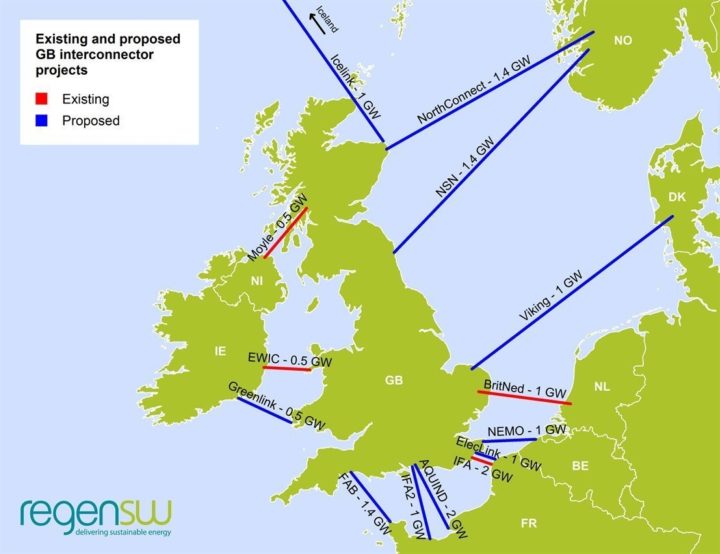Brexit poses energy risks for UK and EU
Could - and should - the energy sector be taken out of the Brexit process?
By George Smeeton
Share
Last updated:
Brexit reminds us of an attempt to make eggs out of an omelette.
If it happens, it would be reasonable to ask whether anything could be salvaged. To put it in in other words: are there sectors that might be able to remain out of the Brexit process?
After all many of Britain's moves out of the EU will have to be compensated with equivalent, and probably renamed, moves in. So, for some areas, could we save the necessity to make the return journey?
Energy might be one such area.
Internal Energy Market and Single Electricity Market
Аn established view is that a lot depends on whether the UK will stay in the single market or not, which would probably determine whether the UK will remain in the Internal Energy Market (IEM). Leaving the IEM could trigger a chain of complex consequences going far beyond the energy sector.

Leaving the IEM would put a strain on the fragile agreement on Northern Ireland. Either the Single Electricity Market (SEM) on the island of Ireland will have to be broken, or Northern Ireland will have to be taken out of Brexit as far as the energy market is concerned.
EU officials have proposed that Northern Ireland could stay in the EU Customs Union. The suggestion instantly triggered a reaction by Nicola Sturgeon, Scotland’s first minister, who expectedly said that if Northern Ireland stays with one leg in the EU, there is no reason why Scotland should not do the same. Theresa May has now said that idea is a non-starter, but the UK government has yet to explain what its proposed solution would be.
Serious confrontation could grow out of the debate about what energy market Northern Ireland should be in. Playing games with the potentially explosive Northern Ireland peace process is a risk that almost nobody with any wisdom wants to take. The suggestion that energy is somehow too technical a question to interfere with the peace process would be premature: a couple of years ago the mishandling of a renewable energy scheme led to a serious clash in NI that resulted in the resignation of the late Martin McGuinness as Northern Ireland's deputy first minister.
Brexit could also disrupt the future of the Irish Republic's energy system. The Republic is already exploring the possibility of building an LNG terminal and an electricity link to France in order to compensate for the potential impact of Brexit. Brexit could also disrupt development of an integrated regional energy market that would enable the proper integration of the growing renewable energy generation capacity.
And since the wind in the North Sea makes the region one of the main renewables powerhouses of the continent, the UK leaving the EU could lead to much wider consequences for the energy vision of Europe. The irony is that the UK has been one of the drivers of the European low carbon energy future which could be jeopardised now by the decision to leave the EU.
Further down the line is the plan to connect the UK and Iceland with a high voltage line. The project is supported as part of the EU list of Projects of Common Interest (PCI). Brexit could disqualify this project since each PCI has to benefit at least two EU countries. And again, the problem is not just the individual infrastructure project but the much more complex energy system transition, which is expected to bring us closer to European climate goals, to increase industrial competitiveness, guarantee security of energy supply and lower energy prices.
Energy exemption

The solution to all the market and security risks could be to take the energy sector out of the Brexit process. That might sound like wishful thinking, but it shouldn’t be impossible. With the launch of the Energy Union concept, and with the idea for an Energy Union beyond EU borders, the EU in fact acknowledges that the European energy system is wider than the EU itself.
Energy infrastructure crosses EU borders, and requires close cooperation and common rules in and out of the EU. The Energy Community for instance is an example of how the rules of the EU energy market need to and can be extended beyond the EU in order to integrate systems outside the Union. The CESEC group of EU and non-EU countries in Central and South East Europe is an example of a political energy cooperation across EU borders. The Projects of Common Interests system is also designed to connect EU and non-EU countries.
In short, there is already a base of legal structures and initiatives on which to build.
It seems inevitable that we will move to an integrated European energy market that extends beyond the EU’s borders. Negotiators should make sure that leaving the European Union should not mean leaving the Energy Union. The stakes are too high and the opportunity to keep some of the eggs in a different basket exists.
Julian Popov is a fellow at the European Climate Foundation, and former Minister of Environment of Bulgaria
Share